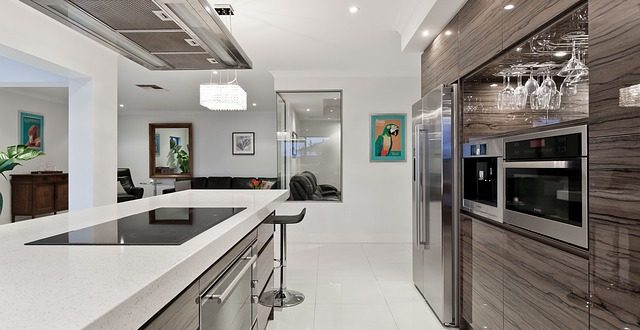Short of space? A home extension could be the answer.
Move or Extend
Our modern lifestyles cry out for more space than our ancestors. With moving costs (estate agents, stamp duty and legal) rising, it is not surprising so many of us are staying put and extending instead. If you are happy where you live and have room to extend; it’s likely to be the most cost effective option.
The home extension industry is booming as we strive to achieve that open plan lifestyle we see in the media. Kitchens are the most important room in a house, so not surprisingly extensions here are the most popular . It can be adding a bedroom for a growing family or a home office, additional bath or shower room, a utility room or extra recreational space.
The Good, the Bad and the Ugly
An extension should add re-sale value to your property, most of us will also want it to look attractive. A badly designed or ugly extension can have the opposite affect. A badly executed “stuck on box” extension can make a property difficult to sell. In extreme cases the value can be lowered as buyers allow for the cost of demolition and replacement.
Ideally the extension should look as though it has always been part of the house. Attention to detail is important. Make sure you use the correct brick and tiles, ensure windows and doors match the existing ones. Experts are available to assist. Getting it right cost more initially but rewarding long term. Value will increase and you will be happier with the work. When the time comes, your house will be easier to sell.
An extension uses up garden space, consider the balance between inside and outside space. The secret to building a good extension is not to rush into it. Ensure you have researched the basic points.
Extension alternatives
If your own has a suitable loft area, a loft conversion is a good option for an extra bedroom and bathroom. It doesn’t use up garden space and is usually cheaper.
Another alternative is to use any underused rooms. Internal alterations such as combining the kitchen and dining rooms could be a fraction of the cost. Space can be found through better design, moving door positions and refitting kitchens.
Getting started
Decide where you think the extension could or should be built around the perimeter of the property. This will dictate the maximum size you can achieve. Take photographs of all elevations of your property and put on graph paper to scale. Think about future requirements, adding a second floor later will be much more expensive.
Decide what type of extension you like and what it is going to look like. Look around your neighbourhood and see what your neighbours have done with a similar style property.
All new buildings are subject to building regulations and either you or your builder will have to pay the local authority to have the progress of the building work inspected and approved. Also the regulations dictate the quality of many materials and the level of thermal insulation you must have in the floors walls and ceilings and windows. Planning permission may be required, your architect or local planning office can advise you.
Budgeting
Decide on your maximum budget, then do your homework to see what this could provide. Websites such as “whatprice” have calculators to give you an idea. Talk to friends or neighbours who have an extension and find out what the final cost of the build came to and also how big the extension was in terms of square metres. Don’t underestimate the cost of wiring, plumbing, fitting out and decorating. Projects invariably go over budget, so allow for contingencies.
Once you have worked out and obtained the above information you can decide whether you wish to proceed and will have an idea of the likely cost and know what you want. The next stage is to get help with drawing up plans.
Choosing an architect
An architect will draw plans and manage the planning process. A recommended architect is the best. Otherwise, contact the Royal Institute of British Architects or Architects Registration Board. You can find local architects by searching online, ensure though that they are fully qualified and registered. Many architects will agree to give you a free first consultation to talk about your plans. Ask to see details of his previous work of a similar nature and talk to one or more of their previous clients.
Take this whole stage slowly and do not proceed if you have any doubts either of the architect or the proposals. It is easier to walk away at this stage than at a later date.
The design process
Architects fees can be a percentage of the total building cost or a fixed amount for preparing drawings and obtaining the various permissions. For an extra fee he may be able and willing to find and recommend a suitable builder, oversee the building work and settle all disputes and payments with the builder.
When discussing the ideas for the extension with the architect try to think forward and decide whether you would really like a two storey extension but for the lack of current funds. If you intend on staying in the house for the foreseeable future then ask the architect about providing footings and walls that could take an additional floor in the future.
You may find that you are able to dispense with the need for an Architect if you are recommended to a Builder who specialises in extensions and who will handle the whole application process for you including the production of plans. But proceed down this route with great care for whilst there are dedicated and highly dependable builders we all know that there are also many cowboys out there.
Project Management
Even a modest extension will require several skills; groundwork, bricklayers, roofers, plasterers, electricians and plumbers. If you appoint one company for the work, they will handle these skills, source materials and project management. Generally they will be used to working together. Expect questions and queries along the way.
Employing individual contractors (mainly on larger projects) raises management complexity. Unless you have experience of construction and you can give the building your full attention, don’t attempt to supervise the work yourself
Other points
Remember to talk to your home insurers or your insurance broker before commencing work to let them know what you are doing and to get their advice. Ask them to ensure that new construction is covered by your policy as you proceed. Ensure you understand what the builder’s insurance covers, e.g. whose policy is meant to cover for materials on-site in the event of their theft. Etc.
Finally think of your extension as the same as building a mini house for it contains all the elements which your main building required and think about access to the area of building and how excavated soil and rubbish will be removed from the site etc. The more thinking you can do for yourself the more likely you will end with a successful extension which could add value by as much as 50 per cent of the total building cost to the price of your house.
 Homeowners Club If you are one of the 15 million homeowners in the UK, the free to join online Homeowners Club is for you.
Homeowners Club If you are one of the 15 million homeowners in the UK, the free to join online Homeowners Club is for you.








